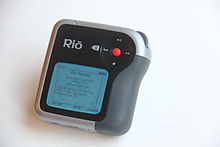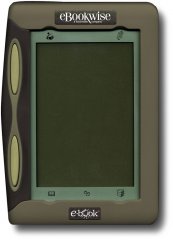There’s been a lot of discussion lately about the definition of a “book,” or more specifically, the proper formatting of an e-book, and the definition of a “page” and its importance in the New eWorld Order.
I’m here to tell you: Unless it’s on paper or in PDF, they ain’t no such thing as a page.
I’ll admit that it took me a while to get used to reading on my eBookWise. Between the whacked-out spacing and the left justification and the lack of paragraph indents, it looked…sloppy. Inferior. But I stuck with it and realized that each book is formatted differently; some are prettier and easier to read than others, but mostly not. I did, however, have problems even with the “prettiest” of the formatting. I was able to adjust my expectations of the presentation once I realized it was a function of the DEVICE and that the DEVICE was not a print book. The print book and the e-book simply have nothing in common except the words they contain: not headers, not footers, not design, not formatting, not…page numbers.
To use the “page” as common ground, each user must have the same edition of a paper book and/or the same edition of the PDF file, but that’s a fairly easy task to accomplish.
In any other format, however, it’s nearly impossible without each user having the same device, the same font settings (i.e., large or small), the same page view settings. Gentlemen, let’s synchronize our devices. Taking the probability of that into account, then, the concept of the “page” vanishes.
The latest argument I have seen for the need for strict pagination in e-books to approximate or duplicate that of a print book is for reference books and the uses of academia viz. for annotation and bibliography, tables of contents and indices, footnotes and end notes. What this demonstrates to me is ignorance or lack of vision or an inability to understand the vast differences in the format, and the capabilities and limitations of each.
ANNOTATION and BIBLIOGRAPHY
 When your bishop or your preacher or your pastor or your minister or other Protestant-type ecclesiastical leader gets up and wants everybody to flip open their Bibles, does s/he say, “Please turn to page 1436 in your Bible”? No. He says, “Romans chapter 15.” (Cause that’s where mine is. In the King James Version. What if you prefer to use a different version? No problem! Romans chapter 15 is still where it’s supposed to be, which is between Romans 14 and Romans 16.)
When your bishop or your preacher or your pastor or your minister or other Protestant-type ecclesiastical leader gets up and wants everybody to flip open their Bibles, does s/he say, “Please turn to page 1436 in your Bible”? No. He says, “Romans chapter 15.” (Cause that’s where mine is. In the King James Version. What if you prefer to use a different version? No problem! Romans chapter 15 is still where it’s supposed to be, which is between Romans 14 and Romans 16.)
 When your English lit professor or your director or your acting coach directs you to a certain passage in a Shakespearean play, does he say, “Please turn to Hamlet, page 783”? No. (Well, first of all, he’s OBVIOUSLY working from an anthology if it has 783 pages to begin with.) He says, “Please turn to Act 2, Scene 2, Line 35.” So what this means is I was smart and brought my little bitty Hamlet and everybody else was stupid and brought their big fat anthologies. And it makes no difference whatsoever.
When your English lit professor or your director or your acting coach directs you to a certain passage in a Shakespearean play, does he say, “Please turn to Hamlet, page 783”? No. (Well, first of all, he’s OBVIOUSLY working from an anthology if it has 783 pages to begin with.) He says, “Please turn to Act 2, Scene 2, Line 35.” So what this means is I was smart and brought my little bitty Hamlet and everybody else was stupid and brought their big fat anthologies. And it makes no difference whatsoever.
The two print books, Bible and Shakespearean anthology, have page numbers. But they aren’t referred to or necessary for annotation or bibliography. In fact, the only thing they’re used for is within the book itself to create tables of contents and indices.
So let’s talk about that.
TABLES OF CONTENTS, INDICES, and FOOT/END NOTES
There’s only one thing a table of contents and/or index is good for: To find your place in the book. Thing is, in a print book, that’s the only way you can find anything…maybe kinda sorta quickly.
In an e-book, the tables of contents and indices have completely different purposes. In fact, an index isn’t even necessary in an e-book, although I would argue that a table of contents is. However, their function and mechanism of use are entirely different from that of a print book.
1. It’s called a hyperlink.
Now, don’t be scared. I’m sure you’ve seen them before here and elsewhere on the interwebz. You put your cursor over it and click and boom…you’re somewhere else on the interwebz. Cool, huh?
You can do that in an ebook, too.
A list of hyperlinks in the beginning of the e-book serves the same function as the table of contents serves in a print book. A print book has page numbers after the chapter name. An e-book has a hyperlink you touch with your stylus and boom, you’re there, same as it works on the interwebz. No page numbers? No problem! Not necessary at all.
But hyperlinks are good within the text, too. If a word is hyperlinked, you touch it with your stylus and it takes you to further reading. They used to be called “footnotes” and “end notes.” Don’t need those anymore, either. Oh, they’re still footnotes and end notes, but they have no precise structure because it’s not necessary. The device will take you where you need to go.
2. It’s called the “find” function.
You can’t do this in a print book. There is no CTRL-F. There is no “Find.” You go to the table of contents and/or the index and if you’re lucky, that book had an excellent indexer. If you’re not, well, good luck to you then. I’m going out to get some Chinese while you look for that reference. Want anything?
Is there an e-reading device that doesn’t have a “find” function? If there is, smash it and get something else, ’cause there is no point to an e-reading device without a “find” function. Because why? Because there are no page numbers.
If the argument (with regard to reference material) is that e-reference books can’t be annotated or bibliographed or referenced, there’s a simple way around that. Organize the book in some other fashion, a la the Bible or Shakespeare. It’s been done. The system’s only been around for a few hundred years now. If it ain’t on paper, it ain’t got pages.
And if it’s inevitable, just lay back and enjoy it.

 When your bishop or your preacher or your pastor or your minister or other Protestant-type ecclesiastical leader gets up and wants everybody to flip open their Bibles, does s/he say, “Please turn to page 1436 in your Bible”? No. He says, “Romans chapter 15.” (Cause that’s where mine is. In the King James Version. What if you prefer to use a different version? No problem! Romans chapter 15 is still where it’s supposed to be, which is between Romans 14 and Romans 16.)
When your bishop or your preacher or your pastor or your minister or other Protestant-type ecclesiastical leader gets up and wants everybody to flip open their Bibles, does s/he say, “Please turn to page 1436 in your Bible”? No. He says, “Romans chapter 15.” (Cause that’s where mine is. In the King James Version. What if you prefer to use a different version? No problem! Romans chapter 15 is still where it’s supposed to be, which is between Romans 14 and Romans 16.) When your English lit professor or your director or your acting coach directs you to a certain passage in a Shakespearean play, does he say, “Please turn to Hamlet, page 783”? No. (Well, first of all, he’s OBVIOUSLY working from an anthology if it has 783 pages to begin with.) He says, “Please turn to Act 2, Scene 2, Line 35.” So what this means is I was smart and brought my little bitty Hamlet and everybody else was stupid and brought their big fat anthologies. And it makes no difference whatsoever.
When your English lit professor or your director or your acting coach directs you to a certain passage in a Shakespearean play, does he say, “Please turn to Hamlet, page 783”? No. (Well, first of all, he’s OBVIOUSLY working from an anthology if it has 783 pages to begin with.) He says, “Please turn to Act 2, Scene 2, Line 35.” So what this means is I was smart and brought my little bitty Hamlet and everybody else was stupid and brought their big fat anthologies. And it makes no difference whatsoever. Currently reading. Excellent, excellent work.
Currently reading. Excellent, excellent work. Started. I wanted to read this book but then saw the ebook price ($11.30! for an ELECTRONIC book!!!), bitched about it, then was offered a copy if I would review it, which I will. I will admit, however, that I find myself reading it through the filter of some blogging unpleasantness elsewhere.
Started. I wanted to read this book but then saw the ebook price ($11.30! for an ELECTRONIC book!!!), bitched about it, then was offered a copy if I would review it, which I will. I will admit, however, that I find myself reading it through the filter of some blogging unpleasantness elsewhere. Started. This seems more of a visual novel to me (I’m a visual reader) and I have to have some quiet time to do it. Between the DDJ (damned day job) and the Tax Deductions, finding sufficient quiet time has been difficult.
Started. This seems more of a visual novel to me (I’m a visual reader) and I have to have some quiet time to do it. Between the DDJ (damned day job) and the Tax Deductions, finding sufficient quiet time has been difficult.

 Something that could store a library in one spot? Like my dream of a jukebox in my hand. Could it be? A library in my hand?
Something that could store a library in one spot? Like my dream of a jukebox in my hand. Could it be? A library in my hand?